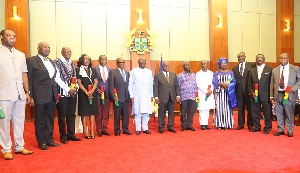- Home - News
- TWI News | TV
- Polls
- Year In Review
- News Archive
- Crime & Punishment
- Politics
- Regional
- Editorial
- Health
- Ghanaians Abroad
- Tabloid
- Africa
- Religion
- Election 2020
- Coronavirus
- News Videos | TV
- Photo Archives
- News Headlines
- Press Release
Opinions of Wednesday, 3 April 2019
Columnist: Kwesi Assamoah
Ghana's big government: A pragmatic approach
Ghana has a comparatively big government managed by one hundred and twenty three (123) ministers out of an approximate population of twenty eight million (28,000,000).
Countries with larger populations and which are richer than Ghana do not come anywhere close to Ghana’s big government.
China (population1.357 billion) has only twenty (20) ministers. Japan (population 1.273 million) has twenty (20) ministers. The USA (population 318 million) has only twenty three (23) ministers. France (population 66 million) has sixteen (16) ministers. Nigeria (population 173 million) has thirty six (36) ministers.
Are we that rich or we just have a problem with profligacy? When the NDC talks about the NPP’s big government the NPP communicators fight them off like a plague. This is not an NPP/NDC affair. It should be seen as a National issue and dealt with appropriately.
It is about time the President of Ghana rethinks his position on this issue. There are abandoned benefits that can be reaped if there is a cut in the number of ministries.
For example there will be massive savings in ministers’ salaries and allowances, salaries and allowances of redundant workers, savings in the purchase of vehicles, savings in the provision of government bungalows, amongst a host of others.
A merger of the following ministries will eliminate twenty ministries:
1. Employment, Labour Relations, and Business Development;
2. Agriculture, Fisheries, and Aquaculture Development;
3. Information and Communication;
4. National Security and Interior;
5. Regional Reorganization and Special Development Initiatives;
6. Transport, Aviation, and Railways Development;
7. Sanitation, Water Resource and Health;
8. Environment, Science, Technology and Innovation and Lands and Mineral Resources;
9. Tourism, Arts, Culture, Chieftaincy and Religious Affairs;
10. The Ministry of Business Development Must be relegated to a government Department.
The mergers listed above will lead to the scrapping of twenty Ministries.
What do we do with the redundant Ministers and their Deputies?
Let them form themselves into business consortiums that can apply for loans/grants and transition into viable businessmen/business women.
We can also seek help from the advanced countries that are doing well without big governments.
A well-intended bi-partisan approach to this problem will be ideal.
Kwasi Asamoah











